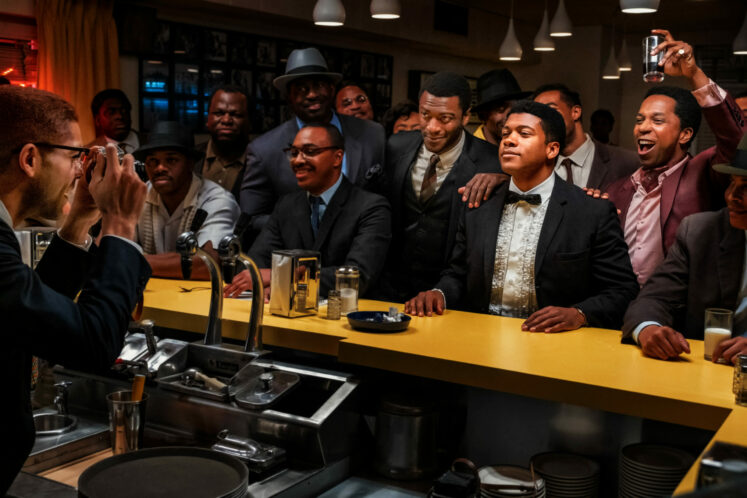It sounds like the answer to the age-old question of who you’d invite to your fantasy dinner party — Muhammad Ali, Malcolm X, Jim Brown, and Sam Cooke.
Yet the basis for the ensemble drama One Night in Miami — in which those four icons share a candid nightlong conversation — is factual, even if the specifics are embellished and speculative.
Specifically, screenwriter Kemp Powers points to Feb. 25, 1964, when upstart boxer Cassius Clay beat Sonny Liston for the first time. After his breakthrough fight, Clay spent the evening with Malcolm, Brown, and Cooke. The next morning, he announced for the first time that he was a member of the Nation of Islam.
“In very different ways, I’ve always viewed these four men as representative of a nascent Black power movement,” Powers said. “Knowing the very real things that happened to these four men leading up to this night, and everything that would happen within the next 12 months, I was trying to have this crucible moment during these interactions with one another.”
After the bout, their impassioned, sometimes heated conversation covers the social pressure of Black celebrity at the time, their responsibilities as potential civil-rights activists, and methods of influencing equality and empowerment, such as overcoming the Jim Crow-era segregation laws that prompted their meeting in the first place.
Powers (Soul) based the script on his own stage play, which was performed in 2013 in Los Angeles. Although the most famous of the four men today is Muhammad Ali, he saw the power dynamic differently on that night.
“Cassius Clay, at 22 years old, has his three big brothers all trying to exert influence over him,” Powers said. “I wanted to have those characterizations be as believable as possible.”
The ensemble cast includes a quartet of up-and-coming actors, including Eli Goree (Race) as Ali, Leslie Odom Jr. (Hamilton) as Cooke, Aldis Hodge (Clemency) as Brown, and Kingsley Ben-Adir (“The Comey Rule”) as Malcolm X.
Brown is the only one of the four real-life inspirations who’s still alive, but Hodge did not meet him before filming. His research took him to a time when Brown was preparing for life after football.
“He’s in a transitional space of maintaining who he is but also taking control of his power and his value. He’s been this megastar for a while but he still sees how people see him and treat him,” Hodge said. “I wanted to display the elegance and the eloquence with which he handled the situation and the subject matter.”
Goree previously auditioned to play Ali in a different production but didn’t land the role. He kept researching and hoping for a second chance that came a couple of years later.
“It was a lifelong dream to play him,” Goree said. “It was preparation meeting opportunity.”
Despite his musical background, Odom initially passed on the chance to play Cooke. However, he relented at the insistence of Oscar-winning actress Regina King, who makes her feature directorial debut with One Night in Miami. Odom later wrote an original song for the soundtrack.
Ben-Adir was cast only about two weeks before filming started, so the British native had limited time to perfect his character’s speech and mannerisms.
“They met on set, and in many cases, their first rehearsal was 20 minutes before they had to shoot scenes,” Powers said. “This was an acting feat that I’ve never seen before. I don’t think people understand how they just got thrown into the deep end.”
Although the film is set almost 60 years ago, Hodge said many of the themes still resonate in terms of the ongoing push for racial equality.
“It’s still the same conversation a lot of us are having today,” Hodge said. “The great thing about the movie is seeing these men, with different opinions on certain things, being able to come together and reach the same goal — in a progressive way that still celebrates and supports one another. That’s needed in our community right now.
“For those who are not really emotionally engaged or invested, they get to sit back and learn. Some people don’t understand what we’re asking for, what we’re talking about — that our pain is real,” he said. “You have four titans who are still not absolved of the stain of the image that America has about the Black community, regardless of their accomplishments. Hopefully you walk away from it with a new charge to understand and empathize a little more. There’s still work to be done.”





